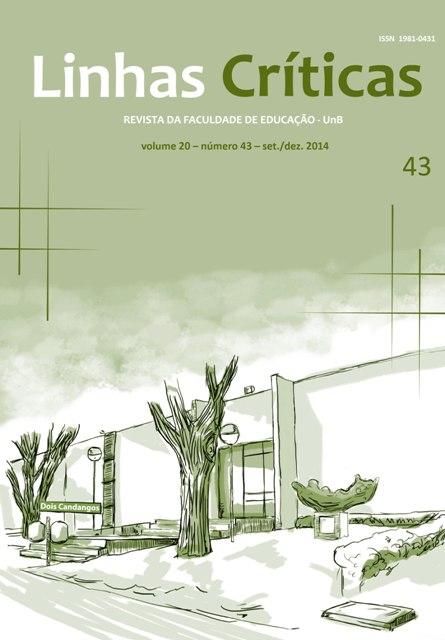Reflexões sobre a neutralidade nos currículos e a sua necessária parcialidade democrática
DOI:
https://doi.org/10.26512/lc.v20i43.4359Palavras-chave:
Currículo, Discurso, Hegemonia, JustiçaResumo
A crescente complexidade das sociedades faz com que tratar de entendê-las sem múltiplas perspectivas seja social e epistemologicamente irresponsável. É necessário conhecer o que intervém ao elaborar um discurso, como a ideologia ou as emoções de quem escreve. Pretende-se pensar aqui como são essas marcas sociais e como se filtram no tipo de currículos que se elaboram. A forma hegemónica de entender o mundo pode estar presente em diferentes contextos, fortalecendo o aparecimento de umas realidades e grupos sociais e silenciando ou enfraquecendo outras. O resultado disto seria material curricular público que não recolhe a diversidade social e cultural sobre a que tem que refletir.
Downloads
Referências
APPLE, Michael. Ideología y Currículum. Madrid: Akal, 1986.BAKHTIN, Mikhail. Teoría y estética de la novela. Madrid: Taurus, 1989.
APPLE, Michael. Problemas de la poética de Dostoyevsky. México D.F.: FCE, 2003.
BHABHA, Homi. O local da cultura. Bello Horizonte: UFMG, 2001.
BHABHA, Homi. O bazar global e o clube dos cavalheiros ingleses: o entrelugar das culturas. Río de Janeiro: Editora Rocco, 2011.
CARBONELL, José L. La atención a la diversidad y la mejora de la convivenciamulti/intercultural”. In: PAREDES, Joaquín y otros (Comps.). La práctica de la innovación educativa. Madrid: Síntesis, 2009. p. 49-57.
CERTEAU, Michel de. História e psicanálise: entre ciência e ficção. Bello Horizonte: Auténtica Editora, 2011.
DEBORD, Guy. La sociedad del espectáculo. Valencia: Pre-Textos, 2005.
FRASER, Nancy. Escalas de justicia. Barcelona: Herder, 2008.
FUKUYAMA, Francis. El fi n de la historia y el último hombre. Barcelona: Planeta, 1992.
IYANGA PENDI, Augusto. Política de la educación y la globalización neoliberal. Valencia: Universitat de Valencia, 2004.
LAVAL, Christian. La escuela no es una empresa. Barcelona: Paidós, 2004.
NUSSBAUM, Martha. Las fronteras de la justicia. Barcelona: Paidós, 2006.
RIÁDIGOS MOSQUERA, Carlos. Instrumentos para a análise da xustiza social nos sistemas educativos: aplicación a materiais curriculares do sistema educativo de Galicia. 2014. 620 p. Tese (Doutorado em Educação). Programa de pós-graduação em Investigação e inovação educativa, Universidade de A Coruña ”“ UDC, Galicia, Espanha. 2014.
SANTOS, Boaventura de Sousa. Para além do Pensamento Abissal: Das linhas globais a uma ecologia de saberes. In: SANTOS, Boaventura de Sousa; MENESES, Maria Paula. Epistemologias do Sul. 2ª ed. São Paulo: Cortez, 2007. p. 31-83.
TORRES SANTOMÉ, Jurjo. La justicia curricular: el caballo de Troya de la cultura escolar. Madrid: Morata, 2011.
VAN DIJK, Teun. Ideología: una aproximación multidisciplinaria. Barcelona: Gedisa, 1999.
VOLOSHINOV, Valentin. Discurso na vida e discurso na arte. New York Academic Press, 1976.
YOUNG, Iris Marion. La justicia y la política de la diferencia. Madrid: Cátedra, 2000.
Downloads
Publicado
Como Citar
Edição
Seção
Licença
Copyright (c) 2016 Linhas Críticas

Este trabalho está licenciado sob uma licença Creative Commons Attribution 4.0 International License.
Autores que publicam nesta revista concordam com os seguintes termos:
- Autores mantém os direitos autorais e concedem à revista o direito de primeira publicação, sendo o trabalho simultaneamente licenciado sob a Creative Commons Attribution License, o que permite o compartilhamento do trabalho com reconhecimento da autoria do trabalho e publicação inicial nesta revista.
- Autores têm autorização para assumir contratos adicionais separadamente, para distribuição não-exclusiva da versão do trabalho publicada nesta revista (ex.: publicar em repositório institucional ou como capítulo de livro), com reconhecimento de autoria e publicação inicial nesta revista.
- Autores têm permissão e são estimulados a publicar e distribuir seu trabalho online (ex.: em repositórios institucionais ou na sua página pessoal) a qualquer ponto antes ou durante o processo editorial, já que isso pode gerar alterações produtivas, bem como aumentar o impacto e a citação do trabalho publicado.



